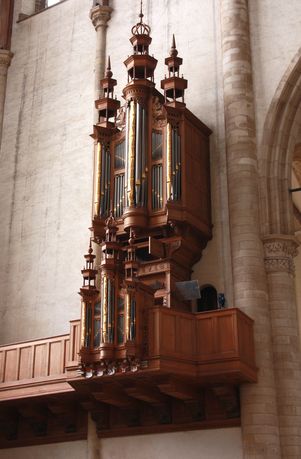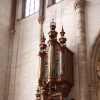Rotterdam - Laurenskerk - Transept Organ
Rotterdam - Laurenskerk, Transeptorgel, Marcussen & Son, 1959
The smaller and the older brother of the main rear gallery organ (which is available as a sample set for Hauptwerk as well) is located in the Transept of the same St. Laurentis church in Rotterdam (Netherlands) and it is a top example of the European organbuilding of the mid twentieth century, in the years following the 2nd World War.
 The bombing of Rotterdam on 14 May 1940 damaged the building as well as its organs. The church was restored after the war, and the new organs were created from scratch, built upon the historical legacy of the previous instruments. The Transeptorgel occupies the space on a balcony where a renaissance instrument was located in the distant past. A medium size instrument was chosen to accompany the services held temporarily in the Transept of the church, which was reconstructed first after the bombing. The historical organ case used comes from the St. Bartholomeus church in Schoonhoven, because it has striking similarity with the renaissance instrument known from 17th century paintings of St. Laurentis. Originally, the case belonged to a Henrick Niehoff organ (1539-1540), but that instrument was out of use for a long time. The Marcussen organbuilding company filled this case with a 3 manual instrument. The main organ case houses a Hoofdwerk and a Pedaal and a tiny Borstwerk underneath. A smaller Rugwerk case was added to the balustrade of the balcony. The lowest octave of the Spitsgedekt 16' is located in a small room behind the organ.
The bombing of Rotterdam on 14 May 1940 damaged the building as well as its organs. The church was restored after the war, and the new organs were created from scratch, built upon the historical legacy of the previous instruments. The Transeptorgel occupies the space on a balcony where a renaissance instrument was located in the distant past. A medium size instrument was chosen to accompany the services held temporarily in the Transept of the church, which was reconstructed first after the bombing. The historical organ case used comes from the St. Bartholomeus church in Schoonhoven, because it has striking similarity with the renaissance instrument known from 17th century paintings of St. Laurentis. Originally, the case belonged to a Henrick Niehoff organ (1539-1540), but that instrument was out of use for a long time. The Marcussen organbuilding company filled this case with a 3 manual instrument. The main organ case houses a Hoofdwerk and a Pedaal and a tiny Borstwerk underneath. A smaller Rugwerk case was added to the balustrade of the balcony. The lowest octave of the Spitsgedekt 16' is located in a small room behind the organ.
The organ has 31 speaking stops, divided into four divisions: Rugwerk, Hoofdwerk, Borstwerk and Pedaal. It is the last work of Sybrand Zachariassen, the leader of the Marcussen company at that time, and it is usually praised as his greatest work. The special feature of the instrument is the horizontal Regaal 16' sticking out of the organ case under the door enclosing the Borstwerk. The door can be opened or closed by a pedal, adding a "swell" effect to the Borstwerk.
Encryption
The samples are offered in 48kHz/24bit resolution. The multiple releases have three levels: short, mid and long. The dry and the surround variants of the sample set are encrypted and dongle protected, which means that they can be used with Hauptwerk software exclusively. Hauptwerk v.5 and higher is required. Hauptwerk Advanced version is strongly recommended, the Lite version is not suitable to run the Surround variant of the sample set (memory limitations, audio channels limitations). There is no use of the sample set possible in any other software.
The wet variant of the sample set is avaliable in plain wave format. Hauptwerk v.4.2 and higher is supported (incl. HW5)
Sample set variants
The sample set is offered in three different variants: dry, wet, surround. Each of the variants is stand-alone.
Dry: samples are recorded with minimum reverberation close to the pipes. There is no reverberation present in the sample set. This variant is suitable for use in reverberant spaces, such as churches. It may also be used with a digital reverb added in postprocessing.
Wet: the "direct" approach. The samples are recorded from shorter distance of the instrument, using a stereo mic pair. A good sense of directness of the speech of pipes is achieved, nice to hear through headphones or a simple 2-channel stereo setup. The samples are proprietary to the wet variant, they are not used in the surround variant. Nevertheless, this variant may be considered a "lite" version compared to the surround variant, there is no blower or tracker noise included and the tremulant is disabled for the Borstwerk. (Tremulants on the Rugwerk are working normally using recorded tremulant waveforms).
Surround: the "moist" and "diffuse" approach. The samples are recorded in multichannel, offering three positions of the listener - close to the instrument ("moist"), in a distance from the instrument ("diffuse") and very far from the instrument ("rear"), allowing to virtually move the listening position in Hauptwerk (to move closer or farther from the instrument). See below for details. This variant of the sample set does not use the samples of the wet variant.
The recording positions of the Wet variant and that of the Surround variant were different. The direct approach (used in the Wet sample set) and the diffuse approach (used in the Surround variant) differ in the distance of the microphones from the organ, the microphones for the diffuse were situated farther away. Therefore, if the Surround variant is used in a simple 2-channel environment, the result would still offer a different audio perspective of the Rotterdam Transept instrument: the result would be more diffused (more reverberant) sound than when the genuine Wet variant is used in the same way. As the result, the sample set in its entirety (dry, wet, surround) offers an unusual flexibility in varying the listener's position.
Keyboards, pedalboard
The original compass of the keyboards is 56 keys. The original compass of the pedal division is 30 keys.
Tremulants
The tremulants are recorded for Rugwerk (except the Scherp). The tremulants for Borstwerk are modelled in the dry and the surround version, because the Borstwerk tremulant was not in function at the time of the recording. The Borstwerk tremulant is disabled in the wet variant of the sample set.
Requirements - Surround variant
RAM consumption: 6-channel surround
-
16-bit, other settings default: 15 GB
-
20-bit, other settings default: 25 GB (recommended)
-
24-bit, other settings default: 30 GB
Requirements - Wet variant
RAM consumption: 2-channel stereo
-
16-bit, other settings default: 5.1 GB
-
20-bit, other settings default: 7.8 GB
-
24-bit, other settings default: 9.5 GB
Requirements - Dry variant
RAM consumption: 2-channel stereo
-
16-bit, other settings default: 2.7 GB
-
20-bit, other settings default: 3.7 GB
-
24-bit, other settings default: 4.8 GB
Other requirements
Screen resolution 1280x1024 px or more.
Polyphony of 2200 simultaneous pipes recommended for use of the wet sample set.
Polyphony of 4000 simultaneous pipes recommended for the surround variant.
Surround format
The sample set is offered in the Surround variant (6 channels). In addition to the usual 4-channel surround, there are two more alternative front channels. In total, there are 4 front audio channels and 2 rear channels. The two pairs of the front ranks feature two different recording positions: direct (near to the pipes) and diffuse (distant from the instrument). These two pairs of the front ranks can either be mixed together freely to achieve any listening position between the two extremes, or used separately - depending on the prefererences of the user. A dedicated "mixing desk" is available in Hauptwerk to mix the sound to the desired level.
| Rugwerk | Hoofdwerk | Borstwerk (enclosed) | Pedaal |
| Holpijp 8' | Praestant 8' | Gedekt 8' | Spitsgedekt 16' |
| Praestant 4' | Roerfluit 8' | Quintadena 4' | Praestant 8' |
| Roerfluit 4' | Octaaf 4' | Koppelfluit 4' | Spitsgedekt 8' |
| Woudfluit 2' | Spitsfluit 4' | Praestant 2' | Octaaf 4' |
| Quint 1 1/3' | Octaaf 2' | Blokfluit 2' | Mixtuur 6x |
| Sexquialter 2x | Mixtuur 5-7x | Sifflet 1' | Fagot 16' |
| Scherp 4x | Cymbel 3x | Cymbel 2x | Schalmei 4' |
| Dulciaan 8' | Trompet 8' | Regaal 16' | |
| Tremulant | Tremulant | ||
The organ offers the usual couplers:
-
Hoofdwerk/Rugwerk
-
Hoofdwerk/Borstwerk
-
Pedaal/Hoofwerk
-
Pedaal/Rugwerk
-
Pedaal/Borstwerk
There are two additional foot levers:
-
M - the organ blower
-
L - the console light on/off (not modelled in Hauptwerk. However, if you have MIDI driven illumination of your hardware console, you can switch its light on or off by using this button. This feature is known to work with Magnus consoles.)
The swell pedal operates the door closing/opening the Borstwerk division.
Wet variant only
Update to version 1.04. Enhancements:
- Wind model adjusted to allow for heavier tutti performance
- A bunch of releases adjusted
-
Rotterdam Transept Surround Sample Set
6-channel surround (front-direct, front-diffuse, rear). Encrypted, dongle protected. Minimum Hauptwerk version: 5. (Also works in all higher versions.) -
Rotterdam Transept Wet Sample Set
2-channel stereo. Plain wave format! Minimum Hauptwerk version: 4.2. (Also works in all higher versions.) -
Rotterdam Transept Dry Sample Set
2-channel stereo. No reverb (dry). Encrypted, Minimum Hauptwerk version: 5. (Also works in all higher versions.) -
Rotterdam Hoofdorgel and Transept Sample Set Surround Bundle
Rotterdam Hoofdorgel + Rotterdam Transept (surround). Minimum Hauptwerk version: 5. (Also works in all higher versions.) -
Rotterdam Transept Sample Set - Crossgrade from Wet to Surround
Rotterdam Transept sample set, the surround variant, if you have bought the wet variant previously. Encrypted, dongle protected.



















